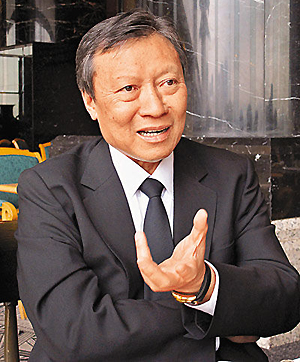Table of Contents
Profile
Zhang Ziqiang(April 7, 1955 - December 5, 1998), nicknamed "The Rich Man", wasHongkongoneCriminal GroupsThe great leader, andTse Ping-hungandYe JihanThey are collectively called "Hong Kong's Three Great Thieves" by the outside world.
| Profession | Crime syndicate leader |
|---|---|
| Criminal penalties | Execution |
| Children | Three men and two women |
| conviction | Illegal purchase and sale of explosives,Kidnapping,Smuggling of weapons and ammunition |
From street thug to bandit
Born on April 7, 1955 in Yulin, GuangxiZhang Ziqiang, was born in a poor family in Yulin, Guangxi. He smuggled to Hong Kong with his parents at the age of 4. This teenager who grew up in the shantytowns of Sham Shui Po showed a rebellious character since childhood: he refused to inherit his father's herbal tea shop business, evaded the arrangement of a tailor apprentice, and wandered the streets all day.
This naughty boy who didn't like reading moved between a herbal tea shop and a tailor shop, but found the joy of life in street fights. At the age of 17, he was imprisoned for the first time for theft, which was like a forewarning of fate and marked the beginning of his criminal career.
Police files show that he has been frequently in and out of the police station since he was 12 years old, and has been involved in more than 20 cases including fighting and theft. His criminal genes were already evident during his adolescence.
Different from the survival rules of traditional gangs, Zhang Ziqiang showed amazing criminal talent. They rejected traditional underworld businesses such as drug trafficking and the pornography industry, and set their sights on lucrative cross-border crimes. This paranoid idea of "elite crime" drives him to constantly challenge the limits of the judicial system.

Kai Tak Airport Rolex Robbery (1990)
In the Rolex robbery at Kai Tak Airport in 1990, he led a group of people to rob 2,500 gold watches in 10 minutes without leaving any biological evidence at the scene. This style of "elegant crime" stunned the police. When he robbed a 170 million armored car the following year, the coincidence that his wife Luo Yanfang worked for a security company exposed his meticulous planning thinking - this was the prototype of the "rich man kidnapping model" that shocked Hong Kong in the future.
When Zhang Ziqiang successfully overturned his conviction on the grounds of "police torture and forced confession" in 1995 and was awarded 8 million Hong Kong dollars in compensation, the man who made a victory gesture to the camera had completed the ultimate transformation from a street thug to a professional criminal.

The Money in the Bank (1991)
16 months later, Zhang Ziqiang's team attacked Kai Tak Airport again. This time they robbed 170 million Hong Kong dollars in cash, setting the record for the largest cash robbery in Asia at the time. The key clue that his wife Luo Yanfang worked for the security company involved in the case, and the 410,000 Hong Kong dollars in stolen goods she deposited after the case, eventually led to Zhang Ziqiang being sent to prison. However, this period of imprisonment became a turning point in the escalation of his criminal network - he met Chen Zhihao, a core member of Yip Kai Fan's group, in Stanley Prison, laying the groundwork for their future alliance.

The pinnacle of kidnapping Li Ka-shing (1996)
At dusk on May 23, 1996, gunshots from 80 Deep Water Bay Road broke the tranquility of Hong Kong. With the tactical efficiency of a special forces unit, Zhang Ziqiang's team imprisoned Li Zeju in an abandoned chicken farm in Fanling. This ruthless gangster who called himself a "criminal entrepreneur" actually dared to go alone to negotiate with Li Ka-shing, and staged a shocking dialogue in his luxury residence on the Peak.
"I want 2 billion, not new banknotes." Faced with the huge demand, Li Ka-shing's calm response and business wisdom are amazing. When Superman suggested investing in Cheung Kong shares, behind Zhang Ziqiang's joking refusal lay the grassroots counterattacker's complex feelings about the capital game. This sky-high ransom of 1.038 billion, which was recorded in the Guinness World Records, not only rewrote the history of crime in Hong Kong, but also gave birth to a professional security industry for the top wealthy people. The Li family immediately formed a 25-member G4 team, and from then on, Hong Kong celebrities had to travel with a fleet of bulletproof vehicles.
The successful model was quickly copied. When kidnapping Guo Binsheng in 1997, Zhang Ziqiang encountered unexpected resistance. The tragic scene of Sun Hung Kai's prince curled up in a wooden box for four days and nights exposed the cruel nature behind the aesthetics of crime. When the Guo family finally paid a ransom of 600 million yuan, Zhang Ziqiang's team had already shown signs of being out of control - from meticulous planning to violent coercion, it foreshadowed the approach of a crazy doomsday.

The Kidnapping of Walter Kwok (1997)
Compared with the "civilized transaction" of the Li family, the kidnapping of the young master of Sun Hung Kai highlights another side of Zhang Ziqiang:
- It took 6 days to break through Guo Binsheng's psychological defenses
- Using violent means such as imprisonment in wooden boxes and low-temperature abuse
- In the end, only 300 million yuan of the 600 million yuan ransom was obtained, exposing some of the stolen goods within the group
Although this operation reduced profits, it caused Guo Binsheng to suffer from post-traumatic stress disorder, laying the fuse for infighting within the Sun Hung Kai family.
Justice in cross-border law enforcement
In January 1998, 800 kilograms of explosives in Ma Tso Lung in the New Territories acted like a time bomb, completely ending Zhang Ziqiang's criminal myth. This crazy plan to blow up Stanley Prison became the last straw that broke the camel's back. When the Guangdong and Hong Kong police launched the joint operation of the "9810 Major Case", the countdown to the end of the century's thief king had begun.
On January 25, 1998, when Zhang Ziqiang was arrested at the Jiangmen toll station, the notebook he carried with him exposed his huge plan: in addition to continuing to plan the kidnapping of Ho Ying-tung and Zeng Xianzhi, he also recorded in detail the arms hiding places in Shenzhen, Zhuhai and other places. The collapse of this transnational criminal network eventually prompted the Guangdong and Hong Kong police to establish a new mechanism of "crime in one place, joint investigation in both places".
After three years in prison, Zhang Ziqiang and his wife launched a "legal blitzkrieg": Luo Yanfang held a press conference to tearfully accuse the police of torture, and hired a team of top lawyers to question the reliability of eyewitnesses. In the end, the High Court changed the verdict to not guilty due to "procedural flaws in the evidence", and the police were ordered to pay HK$8 million in compensation. The photo of Cheung Tze-keung raising the V-sign in front of the court has become a black humor in the history of Hong Kong's rule of law.
At the arrest scene off the coast of Jiangmen, Zhang Ziqiang shouted "Hong Kong residents" and demanded extradition, which triggered a fierce confrontation over the jurisdiction of the two places. In accordance with the territorial principle of Article 6 and the protection principle of Article 8 of the Criminal Law, the Guangzhou Intermediate People's Court sentenced him to death by firing squad on December 6, 1998 for the crimes of illegal purchase and sale of explosives, kidnapping, and smuggling of weapons. The righteous gunshot that echoed through the Pearl River Estuary ended the security nightmare that had plagued Hong Kong for years.
Bloody Apocalypse
Zhang ZiqiangThe case not only left behind a treasury robbery, but also a profound social warning. The crime textbook he wrote personally promoted the establishment of a case reporting mechanism between Guangdong and Hong Kong, and gave birth to the "Cross-Border Joint Arrest Procedures". Those wealthy families whose destinies have been rewritten have built a class moat with billions of security investments. Deep Water Bay Road is still busy with traffic, as if telling the story: in this city of desire, legends and lessons always go hand in hand.
Secretary for Security Regina Ip explains the case of Cheung Tze-keung
Secretary for Security Regina Ip said today (Tuesday) that Cheung Tze-keung and 17 other Hong Kong residents were tried in the Mainland for suspected crimes committed in the Mainland, and there was no question of the Mainland exercising jurisdiction over Hong Kong people committing crimes in Hong Kong.
She stressed: "The mainland authorities exercised jurisdiction over Cheung Tze-keung's case not because the Hong Kong Special Administrative Region is part of the People's Republic of China, but because the alleged crime took place on the mainland."
When explaining why the government's meeting to report on the Cheung Tze-keung case to Legislative Council members today had to be held behind closed doors, Regina Ip said that this was because the trial process in the Mainland was still ongoing, so it was not appropriate to discuss the case in a high-profile manner.
"We also do not wish to hinder in any way the ongoing investigation in Hong Kong and any future judicial proceedings," she said.
Regina Ip pointed out that the current handling of the Cheung Tze-keung case is the same as the government's handling of cases involving other overseas jurisdictions.
"Therefore, there is no question of the SAR government failing to fulfill its responsibilities, as some people have questioned, by insisting on its jurisdiction in this case and seeking the extradition of Cheung Tze-keung and his gang."
The relevant facts are:
- We do not have a formal extradition agreement with the Mainland. However, the Hong Kong SAR Government has an administrative arrangement with the Mainland authorities under which Hong Kong residents whose crimes are all committed in Hong Kong or who are also involved in acts that are illegal under Mainland law will be transferred to Hong Kong after the completion of the Mainland judicial procedures and after serving their sentences, if any.
- Cheung Tze-keung left Hong Kong voluntarily and returned to the Mainland through legal means. At the time he left the country, we had not yet reached a stage where we could prosecute him, nor did we have sufficient grounds to arrest him.
- After his arrest in the Mainland, we did not request the extradition of Cheung Tze-keung under the administrative arrangement because the investigation and judicial proceedings into his criminal acts in the Mainland had already been launched at that time. It would have been inappropriate to do so and this approach was also in line with international practice of extradition of fugitives.
"It is really unfair to accuse the Hong Kong police of not doing their best to investigate this case and prosecute the suspect," said Regina Ip.
"The police take this case very seriously and there is no question of the police shirking their responsibilities."
"Gathering evidence is very difficult as the victim of the kidnapping did not report the crime. The police have contacted the victim but have not yet reached the stage where prosecution can be filed."
Police investigations into the various alleged offences are ongoing.
The Police also exchanged background information and intelligence with Mainland public security agencies, just as they have done in the past with other international organisations.
As the alleged crimes occurred both on the Mainland and in Hong Kong, the Police have deployed an officer to observe the trial in the Mainland as an observer to collect any information that may assist in the follow-up investigation in Hong Kong.
As for the trial conducted in the Mainland, Regina Ip explained that the trial was conducted in accordance with the Criminal Law and Criminal Procedure Law of the People's Republic of China.
She added: "Under the principle of 'one country, two systems', the Hong Kong Special Administrative Region will not and should not interfere with the trial procedures in the Mainland, just as we expect the relevant Mainland authorities not to interfere with our trial procedures."
"The Hong Kong Special Administrative Region respects the judicial system of the Mainland. Similarly, we will not interfere in trial proceedings conducted in other jurisdictions."
over
November 3, 1998 (Tuesday)
Further reading:




